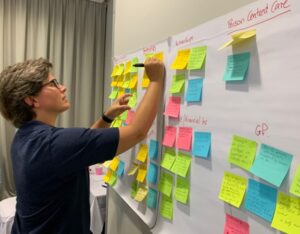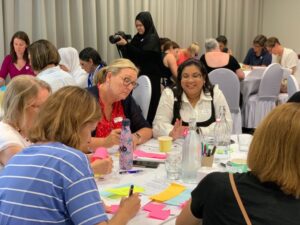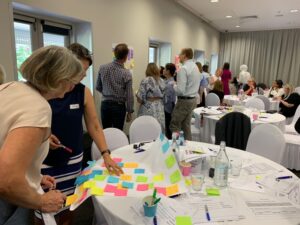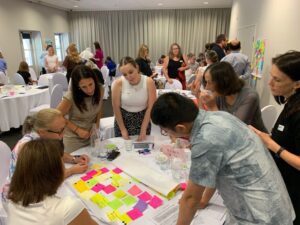In early 2024 a diverse group of health professionals, consumers, educators, researchers and students came together at the Quality Use of Medicines in Chronic Airways Disease Design Thinking Workshop.
Hosted by the Lung Learning Partnership (Asthma Australia, the Lung Foundation and the Thoracic Society of Australia & New Zealand) and facilitated by Social Marketing @ Griffith, the workshop aimed to generate ideas for convenient, patient-centred training with a team approach through experiential learning to reinforce optimal use of medications in chronic airway disease (CAD).
From the outset, we sought to dig deep into the learning context of healthcare professionals, while privileging the lived experience of people with CAD.
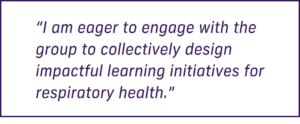 We asked participants prior to the workshop why they were interested in committing the time and energy to what was to be an intensive process of discovery. All demonstrated a commitment to adopting high-tech and humanistic strategies to create training that is current, easily accessible, collaborative and truly conveys the patient experience for optimal skilling of healthcare teams.
We asked participants prior to the workshop why they were interested in committing the time and energy to what was to be an intensive process of discovery. All demonstrated a commitment to adopting high-tech and humanistic strategies to create training that is current, easily accessible, collaborative and truly conveys the patient experience for optimal skilling of healthcare teams.
There were strong themes of addressing issues like behaviour change, medication habits, health literacy challenges and improving self-care through tailored interventions. Shared-decision making models and upskilling for multidisciplinary teams was also a top-order issue.
Asked to ideate a future education program, they saw that an ideal program would make receiving the latest evidence fun, through humanistic, experiential learning that carries though via healthcare teams embracing the patient’s priorities. They also pinpointed that there are number of missed opportunities in the patient journey that could provide a better quality of life for patients. Focusing on these moments using real-world, actual lived experience stories and case studies was seen to be the paramount ingredient in providing the motivation to embrace the patient perspective in healthcare professionals’ encounters with CAD.
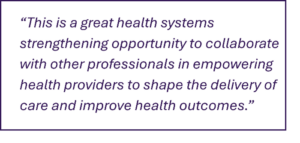
experiences with high impact and for deep collaboration with peers to enhance their knowledge. There was a spirited atmosphere and a genuine desire to make a meaningful contribution to the field of lung health education.
At the workshop, an energetic, imaginative and motivated group all shared an appetite to try something new and innovative, to create learning
It was an exciting and inspiring day centred on a design thinking methodology, which stepped participants through a five-stage process exploring a wide range of ideas. The workshop culminated in developing and testing potential solutions that the Lung Learning Partnership could consider developing further.
From a foundation of lived experience consumer stories, the group developed and pitched ideas with the goal of empowering healthcare professionals to better support the needs of people, and their carers, going through diagnosis and management of CAD.
The workshop generated eight pitches and literally hundreds of ideas which were synthesised into significant learnings about the opportunities to transform healthcare professional education in CAD.
Publication date: March 2024
Author: Jess Tyler, Asthma Australia





 1800 278 462
1800 278 462